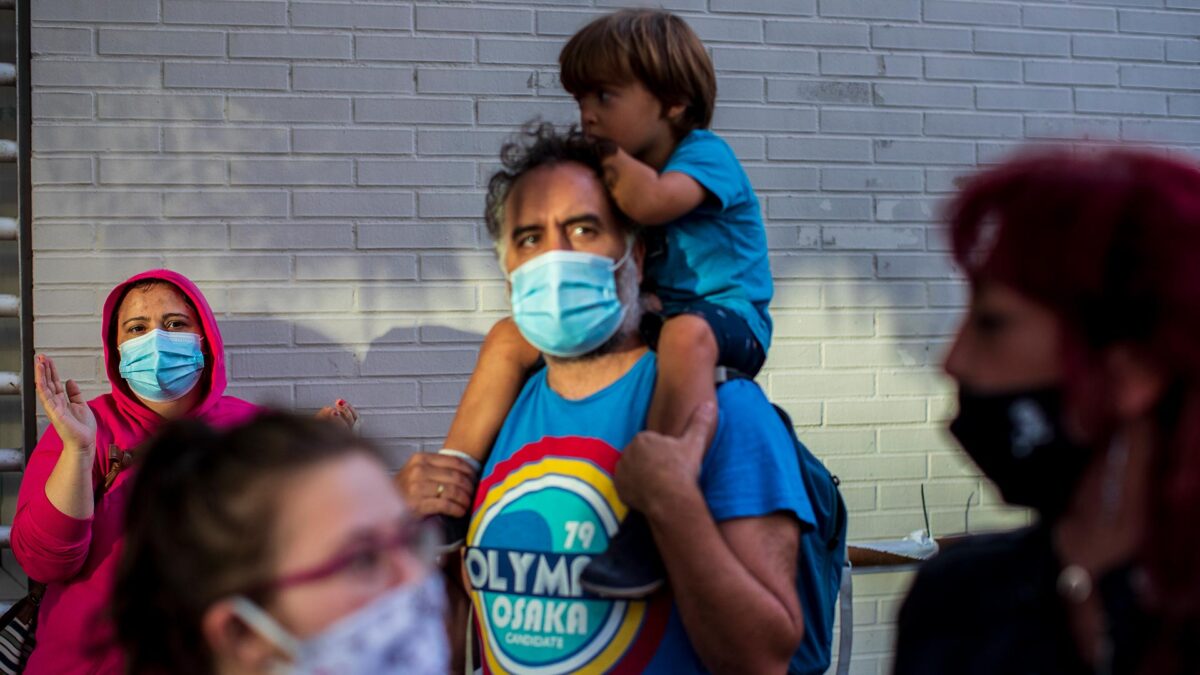The new normality
“The new normality is above all a regime of opinion and a list of the things that are tolerated or censured, which can change as we go along”

Manu Fernandez | AP
During the hardest days of lockdown I got into the habit of singing “The new normality” to the tune of Brassens’s “Bad reputation”. I would get up, make coffee, log onto Zoom or Teams or whatever it was that day and suddenly, almost without noticing it, there was the little tune. You’ll forgive me for being so frivolous, but bear in mind that we had been ordered to be on our best behaviour on Spanish balconies. One day I opened the windows and I put on a recording by Vera Lynn, who had the bad taste to die recently; but apart from that, the sum total of my contribution to the sound track of the pandemic was that furtive, personal crooning.
I now believe that there must be a Freudian residue in comparing the odious phrase to a song by Brassens, of all things. Regimes of opinion —“normalities”— generate reputations, and things that were once frowned on come to be tolerated or compulsory in no time. Look at face masks. The new normality is above all a regime of opinion and a list of the things that are tolerated or censured, which can change as we go along. In Spain a new normality has been brewing for years now, from way before the pandemic, before Sánchez’s vote of no confidence in the PP government, even: but, as the 78 regime dies, literally and metaphorically, we can see clearly what it is we have on the end of our fork, to put it the way William Burroughs would.
A regime of opinion is a regime of memory and its undoing (desmemoria). 1978 had its memory and zones of the forgotten —but neither of these was proclaimed with any particular vehemence, to be sure. It was not within the spirit of the times nor, probably, within the range of possibilities of the experiment. The new normality, on the other hand, is above all a militancy. It is militancy, memory and story even sooner than it is structure, although the structure will get here, like a thief in the night. Maybe it’s those “new elites”, new economic elites, that Pablo Iglesias was talking about, which have a familiar air about them. The elites are elites because they navigate well between normalities, and a political class which is hypnotized by the “linguistic turn” looks like it could put up with any elite worthy of the name for less time than it takes for a lump of sugar to melt in hot coffee. We shall see.
Last week the Minister of Justice announced that the government would begin to process the pardon of those who had been sentenced for the Catalan coup in 2017. A few days before, Judge Ginzburg had died and Spanish media filled up with memes and sincere tributes. The same day that the Minister announced the filing of the measure, Eurodeputy Pagaza published on Twitter a quotation from Tomás y Valiente having to do with pardons and remorse. I realize that Tomás y Valiente did not change the lives of Spaniards as Ruth Ginzburg had done, but he died closer to home, in the same University School where I studied political science, even if now it is in bad form to remember him. (Incidentally, the same people who killed him killed Carmen Tagle a few years before, if we are talking about role models.) In that School today there are professors who proclaim ingenuously that Bildu is a normal party while the right-wing is outside the law, or on the way there. That is the new normality, which makes or breaks (bad) reputations, You could see it coming for a while now, and anyone who has spoken with militants on the left who are fifty years old or younger, knows it. To the point that we have seen a young militant from the Basque PSOE criticize the buddy-buddy relations with Bildu and get a scolding as a result from his elders, and we don’t know by now which of the two things is normal. No, I stand corrected, of course we know.
The foreseeable triumph of the new normality suggests that we should disinvest ourselves emotionally from the country and, most certainly, from 1978. A year ago it was news that a certain political party could not hold events in certain places; now it is the Head of State who cannot go, and nothing happens. After the fall of the USSR it was said that in Russia the regime had dissolved peaceably; Stalin had killed off the last communists years before. Here nobody has to kill anybody else; the surfeit and the worn out material are enough. Disinvest emotionally and tend to your garden, whoever has one and so long as it is possible to go out of doors.
